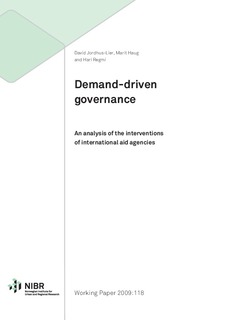| dc.contributor.author | David Jordhus-Lier | |
| dc.contributor.author | Haug, Marit | |
| dc.contributor.author | Hari Regmi | |
| dc.date.accessioned | 2019-08-15T07:41:25Z | |
| dc.date.accessioned | 2021-04-29T13:50:39Z | |
| dc.date.available | 2019-08-15T07:41:25Z | |
| dc.date.available | 2021-04-29T13:50:39Z | |
| dc.date.issued | 2009 | |
| dc.identifier.isbn | 978-82-7071-811-5 | |
| dc.identifier.issn | 0801-1702 | |
| dc.identifier.uri | https://hdl.handle.net/20.500.12199/2344 | |
| dc.description.abstract | Last ned gratis This Working Paper reviews demand-driven governance as a concept, as an element of international donor policy, and as a set of principles which have characterised aid and development interventions in certain post-conflict contexts. Particular attention is being paid to the case of Nepal, and to the interplay between scales of governance, community-state relations and donor coordination if this model is to succeed in facilitating sustainable development in a post-conflict context. Tilknyttet prosjekt Demand driven governance and community intervention | no_NB |
| dc.publisher | Oslo: Norsk institutt for by- og regionforskning | |
| dc.relation.ispartofseries | NIBR-notat 2009:118 | |
| dc.subject | NIBR, PublikasjonerNIBR, Notat_NIBR | |
| dc.title | Demand-driven governance | no_NB |
| dc.type | Notat | |
| fagarkivet.author.link | Haug, Marit;https://www.oslomet.no/om/ansatt/marhau | |
